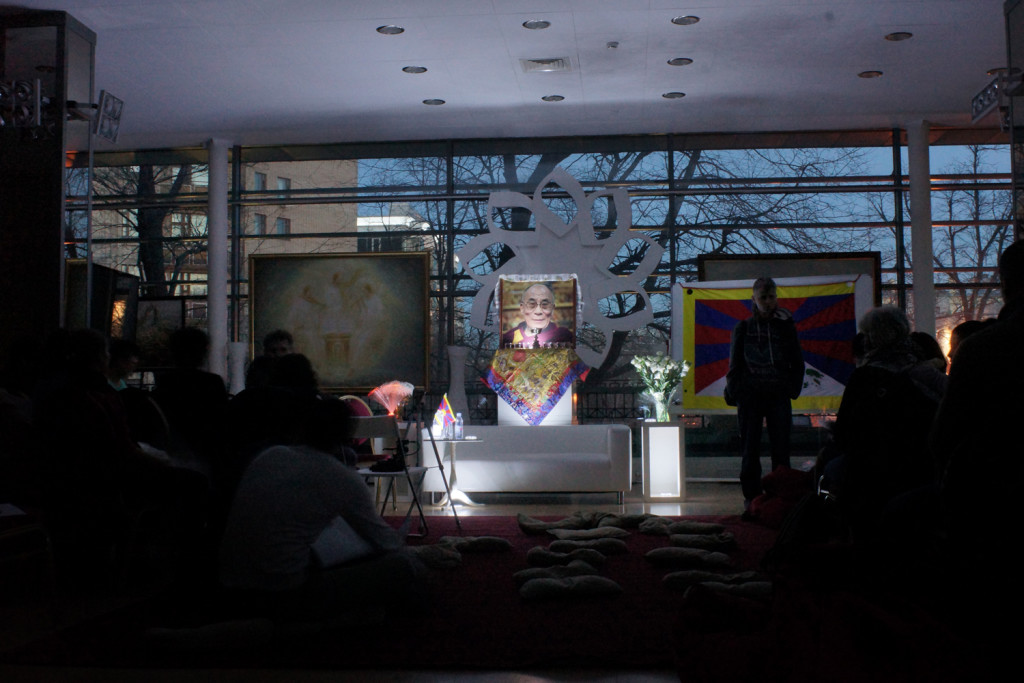Tibetet Segítő Társaság Sambhala Tibet Központ
Tibet Support Association Sambhala Tibet Center
székhely / telephely H-Budapest I. Attila út 123..
(00-36) 70 431 9343 (00-36)70 944 0260 (06-1)782 7721
sambhala@tibet.hu www.tibet.hu tibetpress.info
Facebook/Sambhala Tibet Központ Facebook/Tibett Segítő Társaság
MagnetBank/ 16200010-00110240
IBAN/HU94 16200010 00110240 00000000 SWIFT/HBWEHUHB
(1%) adószám/ 18061347-1-41
nyitva tartás/hétköznap 12.00-20.00 hétvégén előadás függő
» Retro» Tibeti művészet» Interjú» Levelek» Tibet Press» Tibet Press English» Dharma Press» Human Rights» Világ» Kína» Magyar» Ujgur» Belső-Mongólia » KőrösiCsoma» Élettér» Határozatok» Nyilatkozatok» tibeti művészet» lapszemle.hu» thetibetpost.com» eastinfo.hu» rangzen.net» ChoegyalTenzin» tibet.net» phayul.com» DalaiLama.com» vilaghelyzete.blogspot.com» Videók» Linkek» TibetiHírek» Szerkesztőség
Gyertyafényes virrasztást tartottak Moszkvában a március 10-ei felkelés 57. évfordulóján
2016. március 14./CTA/TibetPress
Jelenleg csak angolul olvasható. Magyarul később.
eredeti cikk
MOSCOW: Around 200 friends and supporters of Tibet including Telo Tulku Rinpoche, the Honorary Representative of His Holiness the Dalai Lama based to Russia,Mongolia and CIS countries, gathered at a hall in the center of Moscow to mark the 57th anniversary of the Tibetan National Uprising Day on 10 March.
Addressing the candlelit auditory, Telo Tulku Rinpoche said that it is a dark period in the history of the Tibetan people, and having such a vigil in a semi-darkness helps to create a relevant spiritual atmosphere. He reminded that in 1949 communist China started invading Tibet claiming that they wanted to liberate the Tibetan people from serfdom. Soon it became clear that they came with quite different intentions. Ten years later, His Holiness the Dalai Lama had to flee Tibet and go in exile to India, and on 10 March 1959 Tibetans peacefully rose against the Chinese occupation.
Historically, Russia has had close ties with Tibet. Even geographically, Russia is not as far from Tibet as it may seem. Buddhists from the Eastern parts of Russia used to go to the monasteries in Tibet to study Buddhism and come back to become teachers for their local communities. According to Telo Rinpoche Russian people, who suffered a lot under the totalitarian regime during the Soviet times, can easily relate to the sufferings of Tibetans in Tibet where over 6000 monasteries were destroyed during the cultural revolution, and around 2 million Tibetans were killed.
Speaking of Tibet, we think not only of an ethnic group, but of Tibet’s culture, religion and its heritage. Why is it so important to preserve Tibetan culture and religion? To answer this question Telo Rinpoche used a metaphor, comparing different cultures and religions of the world to the banquet table with different varieties of foods. The more varieties of dishes there are on the table, the more alluring and interesting it is for the guests. Just like this, our universe is much more rich and interesting with many different ethnic groups, languages, cultures, religious traditions and so on. “Look at Tibet as a dessert on this banquet table. If the sweetness is missing from the banquet, something is wrong. Tibet is the sweetness of this universe”. Today Tibetan Buddhism contains the most complete collection of the Buddhist teachings and untainted lineages received from India, added Telo Rinpoche on a more serious note. The number of people in the world interested in the Tibetan Buddhist philosophy and science of mind grows every year. Tibet is very important to the modern world not only because of its culture of nonviolence and spirituality. It is also referred to as the Third pole, and plays a crucial role in the lives of millions of people living downstream and depending on the rivers, flowing from the Tibetan Plateau.
The gathering concluded with a prayer session led by Telo Rinpoche and the Tibetans living in Moscow. Everyone received Russian translation of the prayer text “Words of Truth” composed by His Holiness the Dalai Lama upon coming to exile in India, and the spellbinding murmur of voices filled the hall when all joined to recite in Russian.
– Report filed by Office of Tibet, Russia –
